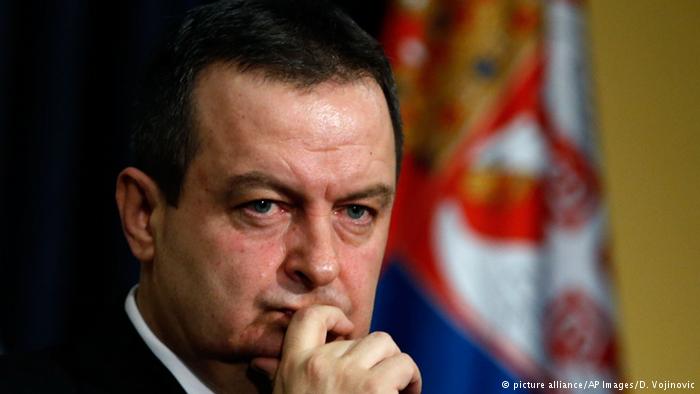




|
|
| Serbia Foreign Minister Ivica Dacic: 'I hope the EU will survive until we're ready to join' |
| + larger fontnormal font- Smaller font |
 Serbian Foreign Minister Ivica Dacic says the EU promotes cooperation between the Balkan countries. He also maintains that Serbia is a stabilizing force - although it refuses to recognize the independence of Kosovo. Serbian Foreign Minister Ivica Dacic says the EU promotes cooperation between the Balkan countries. He also maintains that Serbia is a stabilizing force - although it refuses to recognize the independence of Kosovo.DW: Two decades after the war in Yugoslavia, the Western Balkan region is still considered unstable. Serbia is the largest and most populous of thsose counties. How would you describe its relationship with Croatia, Bosnia-Herzegovina and Kosovo. Ivica Dacic: The Serbian leadership is committed to peace and regional stability. It is working for the continuation of the process of reconciliation and searching for common interests. We must not be irrational. There will never be a solution where everybody loves everybody, but we all live there together in that region, we all have shared a similar history and similar problems. The common goal of all our countries is first of all to stabilize the economy. We have lost a lot of time during the conflicts. The EU should absolutely realize that the path towards European integration holds the Western Balkan countries together and promotes regional stability. We need to start common projects; but it won't be easy, although the war ended a long time ago. In fact, true peace has not been reached yet. Just as someone starts a war, someone should start peace. In that sense, Serbia is making efforts and is not returning to the past. Unlike some other countries, where you have anti-Serbian politics that are provoking Serbia and jeopardizing peace and regional stability. DW: Relations between Serbia and Croatia have deteriorated, with Belgrade blaming Zagreb for this development. Why is that? Ivica Dacic: Croatia is now a member-state of the EU and is using this position to set Serbia various ultimatums and conditions by which they are trying to block Serbia's move towards the EU. They publicly threatened that Serbia would never become a EU member-state, because they would not allow that. One of the issues is the law regarding the prosecution of war-criminals, but we are respecting the international laws. The second issue is that anti-Serbian campaigns have become a normal thing in Croatia. There is also the issue of the rehabilitation of Ustasha independent state of Croatia, which was dolf Hitler's creation. Unfortunately, in numerous concentration-camps of that time hundreds of thousands of Serbs, Jews and others died. Now, with the blessing of the Croatian authorities, people are rehabilitated who committed acts of war-crimes against Serbs during the Second World-War. This generates reactions on the Serb side. That's why I think we should resolve our bilateral issues and problems in a reasonable manner. But we will certainly never accept any rehabilitation that insults Serb victims of the Second World War. We believe that the EU should react as well. DW: How is the relation with Kosovo? When will Serbia recognize Kosovo's independence? Ivica Dacic: The Kosovo-issue is not of a political nature. It's a problem of international law. Serbia cannot accept that it is legal that one part of your territory can claim independence without your agreement. Tomorrow this might reoccur in some other part of the world. Take for example Catalonia in Spain. They want to repeat this example of Kosovo, unilateral and without any agreement from Madrid. You know, the U.S. Assistant Secretary of State, Victoria Nuland, told me that the US had been investing in the independence of Kosovo for about 20 years. I asked her how this could be possible, because at that time the US were supporting the sovereignty of Serbia. She said: Yes, we are actually supporting the sovereignty of Serbia, but without Kosovo. And I said: Well, the Russian Foreign Minister Lavrov said the same thing to me. He said that Russia respects the sovereignty of Ukraine, but without Crimea. So what can we do? We do want to resolve these problems, but we cannot accept a policy of unilateral acts. Serbia has its own interests and we have had a lot of dialogue with Prishtina. But Prishtina is not fulfilling its obligations undertaken under the process agreement. So we are far away from the normalization of our relations. But "normalization" of our relations does not include that we even think of recognizing the independence of Kosovo. DW: Considering all the discussions within the EU at the moment, is it a union you want to join? Ivica Dacic: We are more "European" than some of those who are already member-states. That's what I used to say even before the Brexit-referendum in the United Kingdom. Why? Because for the people of the Balkans who have been burdened with conflicts for years, the EU is a unifying factor which gives an encouragement to regional cooperation. It is our conviction that it's worth fighting for those goals to become a EU-member. I only hope that the EU will survive until we enter. DW: And will Serbia some day apply for NATO-membership too? Ivica Dacic: No, we are not thinking about this topic. We have our position of military neutrality and we don't want to be a member of any military alliance, not only NATO. On the other hand, with NATO we have the highest possible level of cooperation any country, that does not want to be a member, can have. |